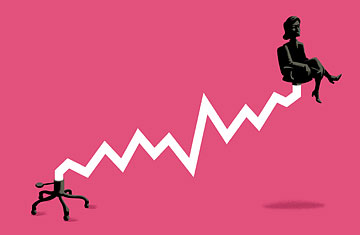
Economists have long believed that the least productive societies are those in which women are denied opportunities to join the workforce. In underdeveloped countries, women typically go without the most basic tools needed to earn a living: education, training and access to capital. Yet there is abundant evidence linking economic progress with empowered women. A recent study by the London School of Economics, to name just one example, showed that states in India where women are better educated were also those with higher economic growth rates.
To spur growth in impoverished countries, a handful of enlightened capitalists have been trying to unleash these distaff entrepreneurial spirits. One of the most high-profile efforts has been the microfinance movement. Since the 1970s, tens of thousands of poor women have started their own businesses — often with a single sewing machine — using loans of as little as $100 from organizations like Grameen Bank in Bangladesh and the Washington, D.C.-based Foundation for International Community Assistance (FINCA), which has been active in Latin America. The results have been eye-opening: women turned out to be reliable debtors, and since many who received microloans squirreled away their earnings to send their children to school and buy more food for their families, the positive impact has rippled through communities.
But when it comes to transforming entire economies, microlending has its limits. Most female-run start-ups have remained, well, micro. In Egypt, for example, about 97% of women-owned businesses employ fewer than five people, according to Maha El Shinnaway, Professor of Management at the American University in Cairo. World Bank economists say that's because access to capital is only one piece of a larger puzzle. To become bigger fish, women also need management know-how. "For any business to grow, in addition to a loan, you also need skills," says Geeta Rao Gupta, president of the International Center for Research on Women. "Microloans are not enough. Women are getting stuck."
Help getting unstuck is on the way. Last year, the World Bank began funding management training for women in Tanzania and Uganda. This month investment bank Goldman Sachs announced it would spend $100 million over the next five years on business education for 10,000 women entrepreneurs in Asia, Africa and the Middle East. The idea is to link universities in the developing world with top U.S. programs — including the business schools at Harvard and Stanford universities — to educate budding businesswomen in poor countries. Goldman Sachs researchers concluded that skilled businesswomen could boost economic output in Asia and Africa, where the bank has sunk billions. "We're always looking for the best investment," says Dina Habib Powell, Goldman Sachs' head of corporate engagement. Let 10,000 flowers bloom.